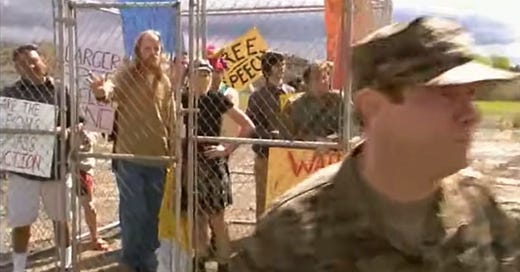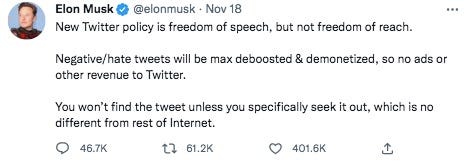Elon Musk's Establishment Retrench and How "Freedom of Speech, but not Freedom of Reach" Targets the Freedom to Hear
The "Freedom to Hear" has long been recognized as at least a corollary to, if not even more important than, "Freedom of Speech". But this undermined critical right is being openly abrogated by Musk.
I wrote the piece below yesterday evening. It would seem to be confirmed by what I learned this morning: the journalist Garland Nixon (and former ACLU board member) was just suspended from Twitter for this tweet from a week or two ago:
Musk is a “defense” and “intelligence” contractor. He now owns Twitter. Twitter had a problem in that rightwing (and potentially populist) platforms were sprouting up. What he’s doing is rebranding and retrenching the establishment. This is similar to what Trump did by promising “America First” but delivering John Bolton and Mike Pompeo. Nixon is being suspended for offering blunt criticism of U.S. foreign policy.
What is being targeted is the public mind. And critically, the right of the public to hear information that seriously scrutinizes the establishment.
Much criticism of Elon Musk’s running of Twitter is silly or worse. Take CBS News deeming the platform unworthy of their participation, at least for a while. My last piece led with how CBS News jumped on the false AP report that Russia bombed Poland. Somehow these big media outlets just walk away from demented reporting risking World War III. And they pretend to sit in judgement of others.
Musk said he won’t reinstate Alex Jones but people like Anders Åslund of the Atlantic Council, who just called for Biden to bomb Russia based on false information, are apparently okay.
Musk has reinstated various tentacles of the establishment, Jordan Peterson, Kathy Griffin and the Babylon Bee. He hasn’t reinstated antiestablishment voices like Dr. Meryl Nass, Daniel McAdams, Scott Ritter, The Last American Vagabond and countless others.
So, in a sense, he’s behaving like Trump: He has the veneer of an outsider, but ultimately serves the establishment.
As Whitney Webb has noted, “Musk is a military and intelligence contractor via SpaceX, he's here to sell the public on this tech.”
And, like Trump, he says what he’s doing more openly at times than the rest of the establishment. For example, he recently tweeted:
Musk calls himself a “First Amendment absolutist” but he rejects “freedom of reach” — commonly known as shadow banning against “negative” “hate” tweets. However that’s defined. And he says you can’t get certain information unless you “specifically seek it out” — claiming that’s no different than the rest of the internet. He seems to be normalizing shadowbanning and Google’s practice of skewing and hiding information.
This runs completely contrary to a remarkably beautiful articulation of freedom of speech set forth by Lew Hill, a founder of Pacifica radio.
Some 20 years ago, I was closely involved in the struggle around Pacifica radio. Someone in the midst of that fight gave me a CD of an old broadcast of Lew Hill on KPFA, the original listener-sponsored radio station.
Hill said something I’d never heard before. He said there’s one thing more important than freedom of speech. That’s the freedom to hear.
That is, the only thing more important than someone having a critical idea being free to share it is: The right of the public to hear it. The public has a right to receive critical information. As the KPFA Folio stated in 1949:
“Every public issue has more than two sides. And somewhere among the many shades of opinion is to be found an approach that represents the best possible solution. Sound public policy can be developed only when we have the freedom to hear all these ideas presented in the presence of their opposing ideas. Only in this way are issues sharpened, weaknesses revealed, propaganda exposed. KPFA is endeavouring to make just this type of approach to public affairs. Through the use of differing program formats, by raising the ‘embarrassing’ issues, by enlisting the cooperation of able speakers of all shades of opinion, and, above all, by giving public affairs favourable listening hours — by all these means, KPFA is endeavouring to become the source of the area’s most continuous and incisive examination of public affairs. [Bold emphasis added throughout; via dissertation by Gene R. Stebbins [PDF].]”
The notion that receiving as well as imparting information should be guaranteed is in Article 19 of the Universal Declaration of Human Rights: “Everyone has the right to freedom of opinion and expression; this right includes freedom to hold opinions without interference and to seek, receive and impart information and ideas through any media and regardless of frontiers.”
See from the American Library Association:
“The Supreme Court and other courts have held conclusively that there is a First Amendment right to receive information as a corollary to the right to speak.
The right to speak and the right to publish under the First Amendment has been interpreted widely to protect individuals and society from government attempts to suppress ideas and information, and to forbid government censorship of books, magazines, and newspapers as well as art, film, music and materials on the internet. The Supreme Court and other courts have held conclusively that there is a First Amendment right to receive information; the right to receive information is a corollary to the right to speak. Justice William Brennan elaborated on this point in 1965:
’The protection of the Bill of Rights goes beyond the specific guarantees to protect from Congressional abridgment those equally fundamental personal rights necessary to make the express guarantees fully meaningful. I think the right to receive publications is such a fundamental right. The dissemination of ideas can accomplish nothing if otherwise willing addressees are not free to receive and consider them. It would be a barren marketplace of ideas that had only sellers and no buyers.’ Lamont v. Postmaster General, 381 U.S. 301 (1965).”
American Association of University Professors has similarly said “the freedom to hear is an essential condition of a university community and an inseparable part of academic freedom.”
The ACLU in 2013 referred to a “whistleblower’s right to speak — and the public’s right to hear what he has to say.”
Unfortunately the ACLU has floundered on some related issues. See my interview with the group’s former president, Nadine Strossen from last year on the threat of Big Tech and big government colluding against the First Amendment.
In fact, one radical thing that Elon Musk could do right now is to disclose any communication between Twitter and the U.S. and other governments regarding the silencing of various voices.
I interviewed Strossen after a group calling itself the “Center for Countering Digital Hate” put out a list of “The Disinformation Dozen” — so-called “anti-vaxers”. Too many were silent about that nefarious move and what it could lead to as should be increasingly obvious.
The establishment of “free speech zones” was mocked by Arrested Development in the video atop this piece. But it is a fair representation of the dystopian reality that is upon us in the powerful online realm if the current attacks on freedom of speech are not overcome.
It’s also a representation of what Lew Hill was rebelling against. He was a conscientious objector to World War II and founded KPFA and Pacifica after the war to rage against a pacifism that wanted to do it quietly. He didn’t seek to simply wash his hands of the stain of the murderousness of war, but to spread the message to the public. He sought not to be marginal, but to stand clearly against a militarized machine in the light of day.
Can we do any less?







More on the right to hear
https://mtsu.edu/first-amendment/article/1549/right-to-receive-information-and-ideas
Hi Sam, It's "The Last American Vagabond" not "This American Vagabond". Thanks for this article.